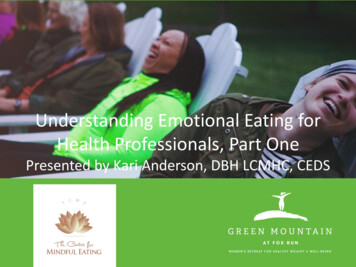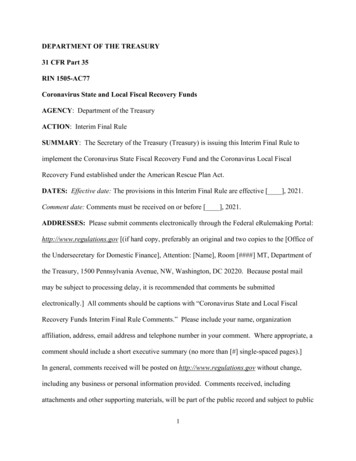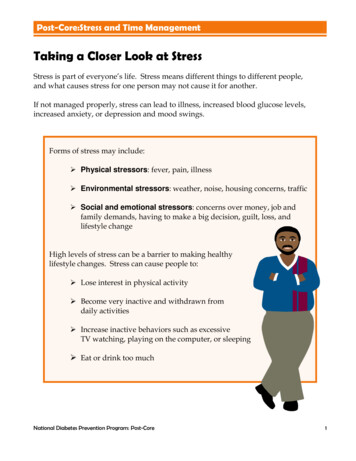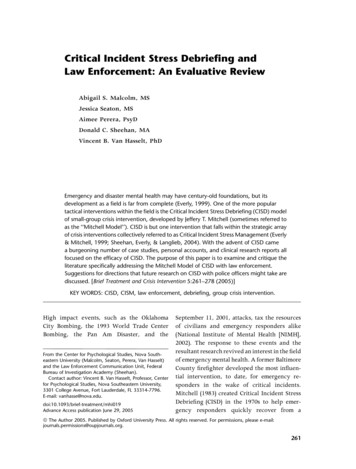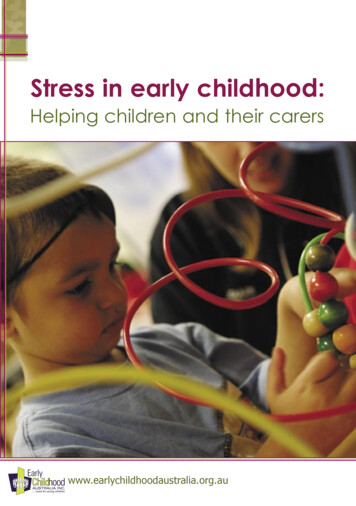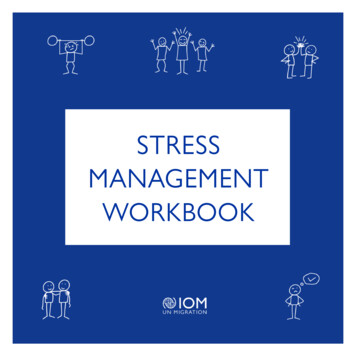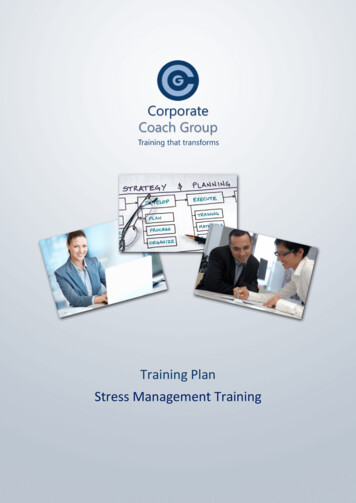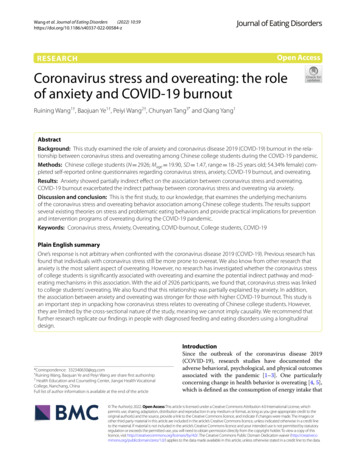
Transcription
(2022) 10:59Wang et al. Journal of Eating zOpen AccessRESEARCHCoronavirus stress and overeating: the roleof anxiety and COVID‑19 burnoutRuining Wang1†, Baojuan Ye1†, Peiyi Wang2†, Chunyan Tang3* and Qiang Yang1AbstractBackground: This study examined the role of anxiety and coronavirus disease 2019 (COVID-19) burnout in the relationship between coronavirus stress and overeating among Chinese college students during the COVID-19 pandemic.Methods: Chinese college students (N 2926; Mage 19.90, SD 1.47, range 18–25 years old; 54.34% female) completed self-reported online questionnaires regarding coronavirus stress, anxiety, COVID-19 burnout, and overeating.Results: Anxiety showed partially indirect effect on the association between coronavirus stress and overeating.COVID-19 burnout exacerbated the indirect pathway between coronavirus stress and overeating via anxiety.Discussion and conclusion: This is the first study, to our knowledge, that examines the underlying mechanismsof the coronavirus stress and overeating behavior association among Chinese college students. The results supportseveral existing theories on stress and problematic eating behaviors and provide practical implications for preventionand intervention programs of overeating during the COVID-19 pandemic.Keywords: Coronavirus stress, Anxiety, Overeating, COVID-burnout, College students, COVID-19Plain English summaryOne’s response is not arbitrary when confronted with the coronavirus disease 2019 (COVID-19). Previous research hasfound that individuals with coronavirus stress still be more prone to overeat. We also know from other research thatanxiety is the most salient aspect of overeating. However, no research has investigated whether the coronavirus stressof college students is significantly associated with overeating and examine the potential indirect pathway and moderating mechanisms in this association. With the aid of 2926 participants, we found that, coronavirus stress was linkedto college students’ overeating. We also found that this relationship was partially explained by anxiety. In addition,the association between anxiety and overeating was stronger for those with higher COVID-19 burnout. This study isan important step in unpacking how coronavirus stress relates to overeating of Chinese college students. However,they are limited by the cross-sectional nature of the study, meaning we cannot imply causality. We recommend thatfurther research replicate our findings in people with diagnosed feeding and eating disorders using a longitudinaldesign.*Correspondence: 332340630@qq.com†Ruining Wang, Baojuan Ye and Peiyi Wang are share first authorship3Health Education and Counseling Center, Jiangxi Health VocationalCollege, Nanchang, ChinaFull list of author information is available at the end of the articleIntroductionSince the outbreak of the coronavirus disease 2019(COVID-19), research studies have documented theadverse behavioral, psychological, and physical outcomesassociated with the pandemic [1–3]. One particularlyconcerning change in health behavior is overeating [4, 5],which is defined as the consumption of energy intake that The Author(s) 2022. Open Access This article is licensed under a Creative Commons Attribution 4.0 International License, whichpermits use, sharing, adaptation, distribution and reproduction in any medium or format, as long as you give appropriate credit to theoriginal author(s) and the source, provide a link to the Creative Commons licence, and indicate if changes were made. The images orother third party material in this article are included in the article’s Creative Commons licence, unless indicated otherwise in a credit lineto the material. If material is not included in the article’s Creative Commons licence and your intended use is not permitted by statutoryregulation or exceeds the permitted use, you will need to obtain permission directly from the copyright holder. To view a copy of thislicence, visit http:// creat iveco mmons. org/ licen ses/ by/4. 0/. The Creative Commons Public Domain Dedication waiver (http:// creat iveco mmons. org/ publi cdoma in/ zero/1. 0/) applies to the data made available in this article, unless otherwise stated in a credit line to the data.
Wang et al. Journal of Eating Disorders(2022) 10:59is excessively high in comparison to one’s energy expenditure [6]. While temporary overeating is typical duringoccasions such as feasts and celebrations [7], it becomes ahealth risk when sustained for an extended period. Overeating is associated with weight gain, obesity, as well asfeeding and eating disorders [8]. Additionally, it is relatedto a series of maladaptive psychological outcomes,including internalizing and externalizing problems (e.g.,depression, anxiety, self-harm, and substance use disorders) [9]. Thus, the development and maintenance ofovereating poses a health concern, ultimately jeopardizing one’s entire health and well-being.Stress associated with the COVID-19 pandemic mayplay a substantial role in overeating. Representing a formof chronic stress, coronavirus stress could stimulate thehypothalamic–pituitary–adrenal (HPA) axis to an excessively high degree, resulting in an abnormally high glucocorticoid level in the body [10]. Meanwhile, endogenousopioid release can be induced by chronic stress becauseit adaptively dampens the stress response [10]; however, this process is also related to addiction and excessive food consumption [11]. A substantial amount ofresearch has established the link between various typesof stressors and overeating behavior, as well as examinedthe related biological mechanisms underlying the associations [12]. During the COVID-19 pandemic, a smallnumber of studies have reported a direct positive association between coronavirus stress and problematic eating patterns [13, 14].While the direct link between coronavirus stress andproblematic eating patterns has been established, theexact psychological mechanism by which the link occursremains unclear. Anxiety could be one of these mechanisms. Anxiety, representing a longer-term psychologicalprocess [15], is defined as an emotional reaction to stressthat involves fear, apprehension, a sense of danger, andpersistent thoughts and worries [15]. When individualsare unable to manage stressful events, their risk of developing anxiety is aggravated [16]. Increased mental healthissues, including anxiety symptoms associated with theCOVID-19 pandemic, have been recorded [17], andstress, in particular, has been particularly constructed asa predictor of anxiety [18]. Anxiety, in turn, is associatedwith adverse health outcomes [19] and overeating, in particular [20, 21]. In terms of problematic eating, the evidence consistently demonstrates a link between anxietyand overeating [22, 23], probably because of the lack ofcontrol, negative arousal, and body-image related factors.Furthermore, though a range of negative affective states(e.g., depression and anger) are theoretically associatedwith overeating, the link between overeating and anxietywas remarkably more salient than that and other negativeaffective states [24]. Therefore, with the probable linksPage 2 of 8between coronavirus stress and anxiety, and betweenanxiety and overeating, anxiety could be one psychological mechanism underlying the direct association betweencoronavirus stress and overeating.Burnout, a distinct psychological construct from anxiety [26], during the COVID-19 pandemic might furtherexacerbate the link between anxiety and overeating.Burnout refers to a psychological condition generatedby an extended response to interpersonal pressures [25]and is manifested by emotional exhaustion, feelings ofcynicism, and diminished personal success [26]. The riskenhancing model indicates that while the role of a singlerisk is relatively limited in predicting health outcomes,when the risk accumulates, one risk factor may exacerbate the role of another, resulting in severe mental healthconsequences [27, 28]. The association between generalburnout and overeating has been reported [29]. During the COVID-19 pandemic, studies have documentedincreased overeating [30]. Thus, COVID-19 related burnout might be a relevant construct in the coronavirusstress and overeating association, and might function toenhance the indirect effect of anxiety in the link betweencoronavirus stress and overeating.College students, in general, represent a vulnerablepopulation to the COVID-19 pandemic [18, 31], and theysuffer from unhealthy eating habits [32, 33]. However,because problematic eating is studied primarily amongcollege students in the Western culture and cultural context is critical when examining psychological issues [34],it is critical to further the understanding of eating behavior in other cultural contexts, such as in the Chinese college student population. Therefore, the purposes of thisstudy were to examine: (1) the direct association betweencoronavirus stress and overeating among Chinese collegestudents; (2) the indirect effect of anxiety underlying thislink; and (3) the moderating role of COVID-19 burnoutin the indirect pathway. Coronavirus stress and overeating were expected to be positively correlated (hypothesis1) and partially linked via anxiety (hypothesis 2). Furthermore, the positive link between anxiety and overeatingwas predicted to be strengthened by COVID-19 burnout.The indirect effect of anxiety would therefore be morepronounced with higher COVID-19 burnout (hypothesis3). Figure 1 depicts the proposed study model.MethodParticipantsThis study surveyed 2,926 Chinese college students(Mage 19.90, SD 1.47, range 18–25 years old; 54.34%female). The majority of the participants (37.80%) werefirst-year students, followed by 28.02% second-year,17.40% third-year, and 16.78% fourth-year students.
Wang et al. Journal of Eating Disorders(2022) 10:59Page 3 of 80.93. Confirmatory factor analysis (CFA) in this studysuggested that the one-factor model fit the data well:RMSEA 0.05, CFI 0.99, TLI 0.99, SRMR 0.01,indicating good scale validity [37, 38].AnxietyFig. 1 The proposed moderated modelNone of the participants lived on campus because of theCOVID-19 policy.ProcedureParticipants were recruited from more than 30 universities in 26 regions, such as Jiangxi, Jilin, and Shandongprovinces of China. Universities participating in thestudy included those classified as Double First Class andthose classified as ordinary. Data was collected from February 9 to February 13, 2020. The sampling error wascalculated using the website (https:// www. sphan alyti cs. com/ sample- error- calcu lator/). This sample error of thisresearch was 1.5%, which is considered within the acceptable limit [35].Convenience sampling strategies were used. To collect data, we first created an online survey using SurveyStar (i.e., an online survey distribution website; ChangshaRanxing Science and Technology, Shanghai, China), andthen generated a QR code for easy distribution. Subsequently, the QR code was sent to WeChat and QQ groups(i.e., online social media platforms) to which enrolleduniversity students had exclusive access. Students werethen able to read the study information sheet and indicate informed consent prior to answering the questionnaires at their preferred location and time.This study was approved by the Research Ethics Committee of the first author’s institution. No identifiableinformation was recorded. Students were instructedthat participation in this study was fully voluntary andthat they could exit the survey at any time. Participantsreceived no compensation for their participation.MeasuresCoronavirus stressCoronavirus stress was assessed by the CoronavirusStress Measure (CSM) [36]. The scale has 5 items (e.g.,“how often have you felt that you were unable to controlthe important things in your life due to the COVID-19pandemic?”). Participants rated each item on a fivepoint scale ranging from 0 (never) to 4 (always), withhigher scores showing higher levels of coronavirus stress.In this study, the internal consistency coefficient wasThe Chinese-version of the anxiety subscale of theDepression Anxiety Stress Scale (DASS-21) [39], adaptedfrom Lovibond and Lovibond [40], was used. This scaleconsists of 7 items (e.g., “I felt I was close to panic.”).Participants rated each item on a four-point scale ranging from 0 (very inconsistent) to 3 (very consistent), withhigher scores showing higher levels of anxiety. The scalehas good reliability, validity, and applicability to theChinese population [41, 42]. In this study, the internalconsistency coefficient was 0.89. Confirmatory factoranalysis (CFA) in this study suggested that the one-factor model fit the data well: RMSEA 0.06, CFI 0.99,TLI 0.98, SRMR 0.01.COVID‑19 burnoutThe COVID-19 burnout was assessed by the COVID-19burnout scale [42]. This scale has 10 items (e.g., “Whenyou think about COVID-19 overall, how often do youfeel disappointed with people?”). Participants rated eachitem on a five-point scale ranging from 1 (never) to 5(always), with higher scores showing higher levels ofCOVID-19 burnout. In this study, the internal consistency coefficient was 0.93. Confirmatory factor analysis(CFA) in this study suggested that the one-factor modelfit the data well: RMSEA 0.07, CFI 0.99, TLI 0.97,SRMR 0.01, which indicated that the validity of thisscale was good [37, 38].OvereatingThe Chinese version of overeating [43] was measuredby the loss of control eating subscale of the Three-Factor Eating Scale [44]. This scale comprises 9 items (e.g.,“when I smell a delicious food, I find it very difficult tokeep from eating, even if I have just finished a meal.”),and all questions were asked specifically to the periodafter the COVID-19 pandemic outbreak. Participantsrated each item on a four-point scale ranging from 1(very inconsistent) to 4 (very consistent), with higherscores showing higher levels of overeating. The scale hasgood reliability, validity, and applicability to the Chinesepopulation [45, 46]. In this study, the internal consistency coefficient was 0.94. Confirmatory factor analysis(CFA) in this study suggested that the one-factor modelfit the data well: RMSEA 0.04, CFI 0.99, TLI 0.99,SRMR 0.01, which indicated that the validity of thisscale was good [37, 38].
Wang et al. Journal of Eating Disorders(2022) 10:59Page 4 of 8Data analyses strategyFirst, the descriptive statistics and bivariate Pearsoncorrelations were calculated among the study variablesusing SPSS (version 23). Second, the hypothesized indirect effect of anxiety was examined using Model 4 of thePROCESS macro [47] in SPSS. Third, the hypothesizedmoderating effect of COVID-19 burnout on the indirectlink between coronavirus stress and overeating via anxiety was tested using Model 14 of the PROCESS macroin SPSS. All study continuous variables were standardized prior to analyses. The indirect pathway and moderation models were estimated with 5000 bootstrapresamples to produce bias-corrected confidence intervals [47]. Because only completed surveys were recorded,there is no missing data in the current dataset.ResultsPreliminary analysesThe means and Pearson-correlations among the studyvariables are presented in Table 1. Coronavirus stress wasrelated to greater anxiety (r 0.54), overeating (r 0.34),and COVID-19 burnout (r 0.48; all ps 0.001), supporting hypothesis 1. Anxiety was associated with greaterCOVID-19 burnout (r 0.64, p 0.001) and overeating(r 0.48, p 0.001) and. Lastly, COVID-19 burnout wasrelated to higher overeating (r 0.44, p 0.001).Anxiety as an indirect pathwayCoronavirus stress was related to higher anxiety (β 0.54,p 0.001) and anxiety was further related to greater overeating (β 0.42, p 0.001). The residual direct effectof coronavirus stress on overeating remained positive(β 0.11, p 0.001), but the strength of this association was reduced compared to the total effect (β 0.34,p 0.001). These results showed that anxiety showedpartially indirect effect on the association between coronavirus stress and overeating (indirect effect 0.23,SE 0.015, 95% CI [0.20, 0.26]), and the indirect effectaccounted for 66.84% of the total effect of coronavirusstress on overeating. Therefore, hypothesis 2 was supported (Table 2).Table 1 Descriptive statistics and correlations among studyvariables (N 2926)VariableMSD1231. Coronavirus stress2.270.81–2. Anxiety0.770.540.54***–3. COVID-19 burnout2.440.660.48***0.64***–4. Overeating2.320.540.34***0.48***0.44******p 0.001Table 2 The indirect effect of anxiety on the associationbetween coronavirus stress (CS) and 6.84***455.05***N 2926. Each column is a regression model that forecasts the criterion at thetop of the column***p 0.001The moderation effect of COVID‑19 burnout in the indirectassociation between coronavirus stress and overeatingvia anxietyThe direct effect of coronavirus stress on overeatingwas significant (β 0.06, p 0.001). With anxiety andthe interaction term (anxiety COVID-19 burnout)included in the model, the direct effect of coronavirusstress on overeating remained significant with a smallereffect size. Furthermore, anxiety was, again, significantrelated to coronavirus stress (β 0.54, p 0.001) andovereating (β 0.27, p 0.001. The interaction term ofanxiety and COVID-19 burnout showed a significantpositive association with overeating (β 0.06, p 0.001),suggesting the indirect effect of anxiety on overeatingwas moderated by COVID-19 burnout (Table 3).We subsequently plotted predicted overeating againstanxiety, separately for low and high levels of COVID19 burnout (one SD below the mean and one SD abovethe mean, respectively; Fig. 2). The simple slope testdemonstrated that for college students with low levelsof COVID-19 burnout, anxiety was positively associated with overeating, β 0.21, p 0.001. In contrast, forcollege students with high COVID-19 burnout, anxietyyielded a stronger positive association with overeating,Table 3 Testing the moderation effect of COVID-19 burnout inthe indirect 4***AnxietyAnxiety 1206.84***270.43***N 2926. Each column is a regression model that forecasts the criterion at thetop of the columnCS coronavirus stress, CB COVID-19 Burnout**p 0.01, ***p 0.001
Wang et al. Journal of Eating Disorders(2022) 10:59Fig. 2 Interaction figure for indirect pathsβ 0.33, p 0.001. Thus, COVID-19 burnout strengthened the association between anxiety and overeating.The bias-corrected percentile bootstrap analysis further indicated that the indirect effect of coronavirusstress on overeating through anxiety was moderated byCOVID-19 burnout. Particularly, for college students lowin COVID-19 burnout, the indirect effect of coronavirusstress on overeating via anxiety was significant, β 0.21,SE 0.03, 95% C Iboot [0.16, 0.27]. Comparatively, for college students with high COVID-19 burnout, the indirecteffect was stronger, β 0.33, SE 0.02, 95% CIboot [0.28,0.37]. Thus, supporting hypothesis 3, results indicatedthat the indirect effect of anxiety was exacerbated byCOVID-19 burnout.DiscussionThe current study suggests that the experience of coronavirus stress is associated with increased overeatingamong Chinese college students. Anxiety is one of themechanisms underlying this relationship, while COVID19 burnout moderates the indirect effect of anxiety.COVID-19 burnout, in particular, strengthens the linkbetween anxiety and overeating. While several empiricalstudies have reported the association between coronavirus stress and overeating [48, 49], the current study is thefirst, to our knowledge, to examine the underlying psychological mechanisms of this link among Chinese college students.Anxiety as an indirect pathwayAnxiety represents a partial indirect pathway linking coronavirus stress and overeating. The positive correlationbetween coronavirus stress and anxiety is consistent withPage 5 of 8empirical evidence that both perceived stress and anxiety have increased significantly during the pandemic [50,51], as well as the biological mechanisms underlying thisassociation [52]. It further lends credence to the proposition that stress related to the COVID-19 pandemicmight be a strong predictor of diagnosable psychiatricdisorders, including anxiety [53]. Due to the lack of socialconnections and physical activities during the COVID-19pandemic, individuals who experience stress may havetrouble managing their emotions, resulting in increasedinternationalizing symptoms such as anxiety [54].Importantly, anxiety from coronavirus stress was connected with overeating in the current study. This is consistent with the escape model [55], which postulatesthat overeating is a coping mechanism for individualsseeking to escape from negative self-perceptions by narrowing attention to the unpleasant situation and thusdisinhibiting food intake. While overeating may providemomentary relief or pleasure [56–58], it can also result ina number of negative mental and physical health consequences, including weight gain, obesity, and eating disorders. Our finding thus suggests that proper stress copingstrategies and anxiety management skills might benefitChinese students who develop overeating issues duringthe pandemic.It is also worth noting that the direct positive linkbetween coronavirus stress and overeating persisted,even after anxiety was considered in the model. Thisremaining link implies that, in addition to the psychological disorder symptoms associated with coronavirusstress, coronavirus stress itself might be a distinct andsignificant risk factor for overeating. This outcome islikely given the endocrine and other pertinent biological mechanisms underpinning the relationship betweenchronic stress and binge eating disorder, a conditioncharacterized by excessive eating [59]. Moreover, theremight be other factors within this association. Forinstance, weight concerns, emotional eating tendencies,and appearance overevaluation are all related to overeating and stress [60, 61] and thus could be relevant mechanisms for the current study topic.COVID‑19 burnout as a moderatorCOVID-19 burnout exacerbated the link between anxiety and overeating, hence intensifying the indirect pathway of anxiety in the coronavirus stress and overeatingassociation. Increased levels of burnout, characterizedby greater emotional tiredness and depersonalization, aswell as lower personal accomplishment, have been documented during this COVID-19 pandemic [62]. Addingto prior research revealing that burnout and overeatingcan coexist [63, 64], our finding further alters that theexperience of COVID-19 burnout might be associated
Wang et al. Journal of Eating Disorders(2022) 10:59with poorer dieting habits when Chinese college studentsexperience high anxiety.StrengthsThis study extends prior research on coronavirus stressand overeating by examining the underlying psychological mechanisms during the COVID-19 pandemic in theChinese college student population. The findings concur with a number of theories and empirical studies onstress, anxiety, and poor eating patterns, particularlyin light of the COVID-19 pandemic. More importantly,our findings have practical implications. Overeating prevention and treatment programs may find it effectiveto focus on decreasing coronavirus stress, anxiety, andCOVID-19 burnout. For example, mindfulness-basedstress reduction courses could be evaluated because theyhave been shown to reduce stress and burnout throughimproved attention management and tolerance for negative emotions [65, 66]. Exercise intervention may be beneficial in lowering college students’ anxiety levels [67, 68],hence reducing overeating. Additionally, while screeningChinese college students’ susceptibility to stress, anxiety,and burnout during the pandemic, health professionalsmay find it advantageous to analyze their dietary habitsconcurrently to initiate appropriate early intervention forproblematic eating behaviors.Limitations and future directionsThe following limitations should be considered wheninterpreting the findings of this study. First, this studyutilized a cross-sectional design, which prevents causalinferences. While the current moderated indirect pathway model is suggestive [69], longitudinal investigationsare necessary to compare the current findings [69]. Furthermore, individuals self-reported their emotions, whichmay not accurately reflect their psychological states [70].Other research methodologies, such as interviews, directobservation, or big data analysis, may serve to furtherelucidate the relationships between stress, anxiety, andovereating. Additionally, personality traits, such as neuroticism, which underpin an individual’s susceptibility tounpleasant feelings, may be relevant to the current studytopic [71, 72], and should be examined in future research.Lastly, potential confounders, such as eating disorderstatus [73], food insecurity [74], and living status [75],should be examined in the current study topic.ConclusionThis study is critical in elucidating the relationshipbetween coronavirus stress and overeating among Chinese college students. Because anxiety represents anindirect pathway in this direct association and COVID19 burnout exacerbates the link between anxiety andPage 6 of 8overeating, our study emphasizes the critical nature ofaddressing anxiety and COVID-19 burnout in overeating prevention and intervention programs. Further, coronavirus stress itself represents a direct risk factor forovereating, and, thus, should be considered in these programs. As the COVID-19 pandemic continues, it is critical to monitor college students’ psychological well-beingbecause its link to recurrent overeating may pose longterm health problems.AbbreviationsCS: Coronavirus stress; CB: COVID-19 burnout.AcknowledgementsThanks to everyone who helped during the research.Author contributionsBY and RW conceptualized the study. RW completed the statistical analyses.PW and CT restructured this manuscript and proofread the paper. RW, BY,PW, CT and QY contributed to the drafting and revising of the manuscript. Allauthors read and approved the final manuscript.FundingJiangxi’Key Research Base Project of Humanities and Social Sciences (JD20068)and Science and Technology Research Project of Jiangxi’ Department ofEducation (GJJ200306).Availability of data and materialsThis study data is available to researchers.DeclarationsEthical approval and consent to participateThis study was approved by the Research Ethics Committee of the firstauthor’s institution. We obtained consent from all participating college students before data collection. Participants were given the survey questionnairewhere they provided demographic information and completed the measurements listed above. The ethics review approval code is IRB-JXNU-PSY-2020002.Consent for publicationNot applicable.Competing interestsThe authors declare that they have no competing interests.Author details1Center of Mental Health Education and Research, Preschool EducationResearch Center, School of Psychology, School of Education, Jiangxi NormalUniversity, 99 Ziyang Avenue, Nanchang 330022, China. 2 Departmentof Psychological Science, University of California, Irvine, 92617, 4201 Social andBehavioral Sciences Gateway, Irvine, CA 92697‑7085, USA. 3 Health Educationand Counseling Center, Jiangxi Health Vocational College, Nanchang, China.Received: 14 December 2021 Accepted: 23 April 2022References1. Dubey S, Biswas P, Ghosh R, Chatterjeed S, Dubeye MJ, ChatterjeeetS, et al. Psychosocial impact of COVID-19. Diabetes Metab Syndr.2020;4(5):779–88.2. Pedrosa AL, Bitencourt L, Fróes ACF, Cazumbá MLB, Campos RGB, deBrito SBCS, et al. Emotional, behavioral, and psychological impact of theCOVID-19 pandemic. Front Psychol. 2020;11:2635.
Wang et al. Journal of Eating 19.20.21.22.23.24.25.26.27.(2022) 10:59Stockwell S, Trott M, Tully M, Shin J, Barnett Y, Butler L, et al. Changes inphysical activity and sedentary behaviours from before to during theCOVID-19 pandemic lockdown: a systematic review. BMJ Open SportExerc Med. 2021;7(1):e000960.Scarmozzino F, Visioli F. COVID-19 and the subsequent lockdown modified dietary habits of almost half the population in an Italian sample.Foods. 2020;9(5):675.Sidor A, Rzymski P. Dietary choices and habits during COVID-19 lockdown: experience from Poland. Nutrients. 2020;12(6):1657.Prentice AM. Overeating: the health risks. Obes Res. 2001;9(11):234S-238S.Prentice AM, Diaz E, Goldberg GR, Jebb SA, Coward WA, Whitehead RG.Famine and refeeding: adaptations in energy metabolism. In: AndersonGH, Kennedy SH, editors. The biology of feast and famine: relevance toeat disord. San Diego: Academic Press; 1992. p. 245–67.Goldschmidt AB, Loth KA, MacLehose RF, Pisetsky EM, Berge JM,Neumark-Sztainer D. Overeating with and without loss of control: associations with weight status, weight-related characteristics, and psychosocialhealth. Int J Eat Disord. 2015;48(8):1150–7.Muratori F, Viglione V, Maestro S, Picchi L. Internalizing and externalizingconditions in adolescent anorexia. Psychopathology. 2004;37(2):92–7.Adam TC, Epel ES. Stress, eating and the reward system. Physiol Behav.2007;91(4):449–58.Karkhanis A, Holleran KM, Jones SR. Dynorphin/kappa opioid receptorsignaling in preclinical models of alcohol, drug, and food addiction. IntRev Neurobiol. 2017;136:53–88.Anversa RG, Muthmainah M, Sketriene D, Gogos A, Sumithran P, BrownRM. A review of sex differences in the mechanisms and drivers of overeating. Front Neuroendocrinol. 2021;63:100941.Khubchandani J, Kandiah J, Saiki D. The COVID-19 pandemic, stress, andeati
that they could exit the survey at any time. Participants received no compensation for their participation. Measures Coronavirus stress Coronavirus stress was assessed by the Coronavirus Stress Measure (CSM) [36]. e scale has 5 items (e.g., "how often have you felt that you were unable to control the important things in your life due to the .


